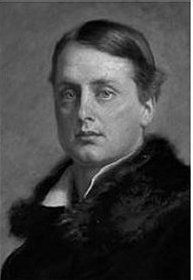Archibald Primrose, 5th Earl of Rosebery
|
|

| |
| Period in Office: | March, 1894 - June, 1895 |
| PM Predecessor: | William Gladstone |
| PM Successor: | The Marquess of Salisbury |
| Date of Birth: | 7 May 1847 |
| Place of Birth: | London |
| Political Party: | Liberal |
| Retirement honour: | Earldom of Midlothian |
Archibald Philip Primrose, 5th Earl of Rosebery (May 7, 1847 - May 21, 1929) was a British Liberal statesman and Prime Minister. Also known as Archibald Primrose (1847-1851) and Lord Dalmeny (1851-1868).
Rosebery's father died when he was three, which brought him the courtesy title of Lord Dalmeny. He attended Eton and went up to Christ Church, Oxford. While there, he was asked to stand as a candidate for Parliament at Darlington when under-age, but refused on the grounds that he had not definitely committed himself to a political party. While at university he set three aims for his life: 1) to marry an heiress; 2) to own a racehorse that won the Derby; 3) be Prime Minister. He managed to achieve all three.
Lord Dalmeny succeeded to his grandfather's Scottish earldom in 1868. The next year he indulged his passion for horse-racing and bought Ladas. University rules prohibited undergraduates from owning racehorses and when the university authorities discovered that he owned one, he was offered a choice between selling his horse or abandoning his studies. He chose the latter.
In 1878 Rosebery married Hannah de Rothschild. She died in 1890.
Rosebery took his seat in the House of Lords on coming of age. He became a Liberal, and was involved in Gladstone's Midlothian Campaign, which brought the Liberals back into power in 1880. In the Liberal administration that followed, Rosebery served in junior offices, including that of Under-Secretary of State for the Home Department (from which he resigned when there was no separate Minister for Scotland). He returned as First Commissioner of Works and Lord Privy Seal, with a seat in the Cabinet, in February 1885.
Rosebery became a leader of the Liberal Imperialist faction of the Liberal Party, and in Gladstone's third (February - July 1886) and fourth (August 1892 to March 1894) administrations, Rosebery served as Foreign Secretary. When Gladstone retired in 1894, Rosebery became his successor as Prime Minister, much to the disgust of Sir William Harcourt, the Chancellor of the Exchequer and leader of the more left-wing Liberals. His selection was largely the consequence of Queen Victoria's dislike for most of the leading Liberals of the day.
Rosebery's government was largely unsuccessful. His designs in foreign policy, such as expansion of the fleet, were defeated by disagreements within the Liberal Party, while the Tory dominated House of Lords stopped the whole of the Liberals' domestic legislation. On June 21, 1895, Rosebery resigned after a minor defeat in the House of Commons, and a Conservative government under Lord Salisbury, took his place.
Rosebery resigned as leader of the Liberal Party on October 8, 1896, to be succeeded by Harcourt, and gradually moved further and further from the mainstream of the party, supporting the Boer War and opposing Irish Home Rule, a position which prevented him from participating in the Liberal government that returned to power in 1905. In his later years, Rosebery turned to writing, including biographies of Lord Chatham, Pitt the Younger, Napoleon, and Lord Randolph Churchill.
He was also noted for his champion racehorses. Ladas II won the Derby in 1894, Sir Visto did it again in 1895, and Cicero in 1905.
Lord Rosebery's Government, March 1894 - June 1895
Archibald-Primrose-arms.PNG
- Lord Rosebery - First Lord of the Treasury, Lord President of the Council, and Leader of the House of Lords
- Lord Herschell - Lord Chancellor
- Lord Tweedmouth - Lord Privy Seal
- Herbert Henry Asquith - Secretary of State for the Home Department
- Lord Kimberley - Secretary of State for Foreign Affairs
- Lord Ripon - Secretary of State for the Colonies
- Sir Henry Campbell-Bannerman - Secretary of State for War
- Sir Henry Hartley Fowler - Secretary of State for India
- Sir William Harcourt - Chancellor of the Exchequer and Leader of the House of Commons
- Lord Spencer - First Lord of the Admiralty
- Anthony John Mundella - President of the Board of Trade
- Arnold Morley - Postmaster-General
- George John Shaw-Lefevre - President of the Local Government Board
- James Bryce - Chancellor of the Duchy of Lancaster
- John Morley - Chief Secretary for Ireland
- Sir George Otto Trevelyan - Secretary for Scotland
- Sir Arthur Herbert Dyke Acland - Vice President of the Council
Changes
- May 1894 - James Bryce succeeds A.J. Mundella at the Board of Trade. Lord Tweedmouth succeeds Bryce at the Duchy of Lancaster, remaining also Lord Privy Seal.
| Preceded by: The Lord Carlingford | Lord Privy Seal 1885 | Succeeded by: The Earl of Harrowby |
| Preceded by: The Marquess of Salisbury | Foreign Secretary 1886 | Succeeded by: The Earl of Iddesleigh |
| Preceded by: The Marquess of Salisbury | Foreign Secretary 1892–1894 | Succeeded by: The Earl of Kimberley |
| Preceded by: William Ewart Gladstone | Leader of the British Liberal Party 1894–1896 | Succeeded by: Sir William Harcourt Template:Succession box two by three to two Template:End box
|
